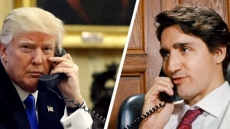OTTAWA - While Canadians stay home in an effort to limit the spread of the novel coronavirus, officials are working behind the scenes to try to increase the health care system's capacity to fight the virus.
For more than a week, health officials have urged Canadians to "flatten the curve," by staying home and keeping a distance between themselves and others to slow down the spread of the virus.
The idea is to spread out the number of cases so health care capacity isn't overwhelmed all at once.
But there's a second half to that equation: while Canadians are flattening the curve, health care systems need to simultaneously increase their capacity.
"We've done it before. The health care system does it annually with the seasonal flu. We do have the ability to respond to surges," said Dr. Gigi Osler, president of the Canadian Medical Association.
"What concerns me is the possibility of the surge greater than one we've seen before."
The race to fortify the health care system started amid the first rumblings of the novel coronavirus in Wuhan, China, earlier this year.
"We have been working with provinces and territories to boost our capacity and to understand what demands would be placed on the health care system if we were to see the same type of curve that we were seeing first in China and then later in Italy and Iran," Health Minister Patty Hajdu said in a briefing Tuesday.
Already some provinces have started cancelling elective surgeries and procedures to free up precious hospital beds and other supplies.
The federal public health agency has also been co-ordinating the purchase of vital supplies like test kits, protective equipment like masks and gloves, and ventilators, said chief public health officer Dr. Theresa Tam.
"All of those things together help improve and increase that line that you saw, that you want to get that curve under," she said.
It's not perfect. Physicians still have concerns about supplies and their ability to keep themselves healthy and able for when the peak really hits, Osler said.
The Canadian Medical Association said it would welcome further measures to make sure health systems have what they need if they're suddenly inundated with patients.
One example would be allowing doctors and other health-care workers from different provinces to pitch in where the demand is highest. That practice is restricted by provincial licensing of health care providers right now.
Meanwhile, some jurisdictions are trying to come up with ways to avoid having patients go to the hospital at all, especially since most COVID-19 cases are mild and can be dealt with at home.
In Alberta, the public health agency put together an online quiz of sorts that lets people assess themselves for COVID-19.
Doctors are also using telehealth and virtual medicine to assess people remotely so they don't flood clinics and hospitals.
But while most cases are mild, others will be life-threatening and deadly, and everyone will have to do their part to keep hospitals from becoming overwhelmed, Osler said.
"My plea to Canadians now is to do everything you can, everything our public health officers are recommending to stay healthy and reduce the spread of COVID-19," Osler said.
"If people can do that now, we as Canadians will get through this."


